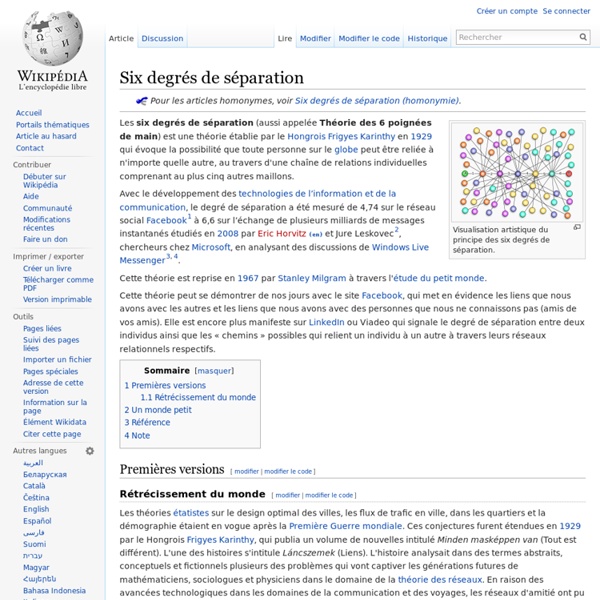



http://fr.wikipedia.org/wiki/Six_degr%C3%A9s_de_s%C3%A9paration
Related: clarinette02releases photos under a Creative Commons licence Licences specify the terms and conditions under which things can be used. All too frequently in everyday life we come across restrictive licences that actually seem to discourage usage, disallowing copying or sharing. But a whole other family of free licences aim to encourage use and sharing, asking simply for proper recognition and reciprocal behaviour in return. Since its inception, CERN has used the web to share multimedia material openly. To signal clearly that we wanted people to use our photos and videos we crafted a pioneering free media licence. It included clauses that satisfied the demands of being an intergovernmental organization, and ensured consistency with our founding convention as a peaceful scientific collaboration.
MAMA - Dev.Opera By Brian Wilson MAMA: What is the Web made of? The Web has search engines—many of them. However, they are typically concerned only with the text content of a Web page. Six degrees of separation Six degrees of separation. Early conceptions[edit] Shrinking world[edit] Theories on optimal design of cities, city traffic flows, neighborhoods and demographics were in vogue after World War I. Mediation - Introduction (Official City of Bellevue Website) What is Mediation? Mediation is a voluntary process in which people in dispute meet with a neutral third party (a "mediator") who guides them through a structured and confidential negotiation. The goals of mediation include:
Tf-Idf and Cosine similarity In the year 1998 Google handled 9800 average search queries every day. In 2012 this number shot up to 5.13 billion average searches per day. The graph given below shows this astronomical growth. The major reason for google’s success is because of its pageRank algorithm. Lessig, Liberation Music, and the issue of “fair use” The issue of “fair use” in relation to copyright in sound recordings came sharply into focus recently when Australian music label Liberation Music found itself as the defendant in a law suit filed in the US District Court in Massachusetts by a Harvard Law Professor, Lawrence Lessig. Lessig is suing Liberation on the basis of provisions in US copyright legislation that seek to prevent copyright owners from making threats to alleged copyright infringers without proper basis. Lessig’s suit is actually a further step in what has been an interesting example of the use of copyright protection measures used in relation to You Tube material.
Dot products Next: Queries as vectors Up: The vector space model Previous: The vector space model Contents Index We denote by the vector derived from document , with one component in the vector for each dictionary term. Unless otherwise specified, the reader may assume that the components are computed using the tf-idf weighting scheme, although the particular weighting scheme is immaterial to the discussion that follows.
Information held in electronic databases not property which can be possessed, rules UK court The Court of Appeal rejected arguments to the contrary and refused to interpret existing laws in a manner which would, it admitted, "have the beneficial effect of extending the protection of property rights in a way that would take account of recent technological developments". The judges said that whilst it is possible to exert control over electronic information it is not possible to gain possession of it. The distinction was drawn in a case concerning a dispute between a publisher and an IT supplier.
Publications scientifiques All publications from Proxem are available on HAL by Inria, the French open-access repository for scientific publishing. Une approche paresseuse de l’analyse sémantique ou comment construire une interface syntaxe-sémantique à partir d’exemples TALN 2010, MontréalThis article shows how to extract a syntax-semantics interface starting from an interchangeable dependency parser, many lexical resources and from samples associated with the semantic representations which one wishes to compute. Our semantic representations are hierarchical graphs of predicate-argument relations between lexical meanings and our syntax-semantics interface is a polarized unification grammar.
Urges Appeals Court to Reconsider Dangerous Copyright Ruling San Francisco - The Electronic Frontier Foundation (EFF) is urging a federal appeals court to reconsider its decision to order Google to take down the controversial "Innocence of Muslims" video while a copyright lawsuit—based on a claim that the Copyright Office itself has rejected—is pending. As EFF explains, the decision sets a dangerous precedent that could have disastrous consequences for free speech. "Innocence of Muslims" sparked protests worldwide in the fall of 2012. Web Squared: Web 2.0 Five Years On - by Tim O'Reilly and John Battelle Five years ago, we launched a conference based on a simple idea, and that idea grew into a movement. The original Web 2.0 Conference (now the Web 2.0 Summit ) was designed to restore confidence in an industry that had lost its way after the dotcom bust. The Web was far from done, we argued. In fact, it was on its way to becoming a robust platform for a culture-changing generation of computer applications and services.